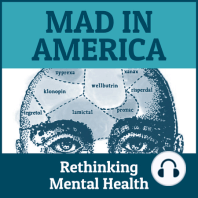34 min listen

Alita Taylor - Open Dialogue - Making Meaning
Alita Taylor - Open Dialogue - Making Meaning
ratings:
Length:
31 minutes
Released:
Feb 16, 2019
Format:
Podcast episode
Description
This week on MIA Radio, we turn our attention to Open Dialogue and we chat with psychotherapist and Open Dialogue trainer Alita Taylor. Alita is a licensed Marriage & Family Therapist, trainer and facilitator based in Tacoma, Washington USA. Her passion is working from a community-based, non-expert, need-adapted Open Dialogue perspective, which utilizes social networks, family, and co-facilitation with other professionals. In this recent blog, Alita shares why Open Dialogue ‘cannot be taught, but needs a teacher‘. Love Is In the Air… I am in love. I’m in love with this way of working. And I won’t stop. Open Dialogue Washington began in 2018 upon my graduation/commencement from Jaakko Seikkula’s dialogic approaches to couple and family therapy trainer/supervisor training, in collaboration with Dialogic Partners and the University of Jyväskylä. In 2016, I embarked to partake in the best training course I had ever experienced as a family therapist. The embodiment I experienced working with my Open Dialogue colleagues felt like the missing key in psychiatry and psychotherapy. Something intangible, yet what I knew all along. Something ineffable, yet also a shared language. Something deeply and autonomically human, yet unrepeatable and fleeting. It led me onto a moment-by-moment path where everything I learned in my 27-year long career about systemic family therapy and emergency psychiatric protocols ebbed, and the present moment of love flowed, neither the ebbing knowledge nor the cresting wisdom having any lesser value than the other. The complete work we do in mental health care is this ocean of love. We are in constant change when we are in crisis. Timelessness sets in. Growth is happening. We don’t exactly know what we need. That is what mental health work is, sitting with this human happening. In the in-between space, something happens, and we don’t know what will. This is the paradox. We are navigating the ebb and flow of incoming knowledge we have from research and the ebb and flow in each patient and family’s difficulties (the meanings they make of them). “It cannot be taught, but it needs a teacher.” After getting trained to facilitate and supervise Open Dialogue, I found that this is the crux of the work, holding more than one truth. As human beings, as a society, as mental health practitioners, we must be able to ask what is helpful, and we must be willing to co-provide this “help” creatively, without barriers, between the digitized rows and columns of tick-boxes and presumptive diagnostic menus. Remember the analog world of dials and infinite decimals? Agency lies within ourselves to expand the possibilities, to be willing to open to solutions that have not yet been tried. Michael Pohl wrote about dialogical leadership and culture in which he referenced Karl-Martin Dietz and Thomas Kracht of the Hardenberg Institute for Cultural Studies in Heidelberg, Germany. Michael remembered a discussion on whether dialogism can be taught or experienced. It was argued that the dialogic attitude cannot be learned and that any thought of teaching it is unnecessary. Michael disagreed. He writes, “It cannot be taught, but it needs a teacher.”— Medium.com, March 2018. In Helsinki and Tornio while learning the Open Dialogue approach, I had many teachers: Jorma Ahonen, Pekka Borchers, Birgitta Alakare, Aino Maija Rautkallio, Kari Valtanen, Tom Erik Arnkil, Jaakko Seikkula, Tapio Salo, Tanja Pihlaja, Eija-Liisa Rautiainen, Pekka Holm. How did they do it? To quote Birgitta Alakare when she was asked about the beginnings of the development of Open Dialogue in the 1980’s, “It was not only me, it was all of us, everyone.” When we include all the stakeholders, all the voices, polyphonically, something extraordinary is given space to emerge. This is challenging to enact when there are systems of health care based on bed occupancy, lengths of stay, productivity, staff ratios, definitions of “emergency” or “inpatient” levels of care. Well, Op
Released:
Feb 16, 2019
Format:
Podcast episode
Titles in the series (100)
Chris Hansen - Making Connections Through Intentional Peer Support: Mad in America: science, psychiatry and social justice by Mad in America: Rethinking Mental Health